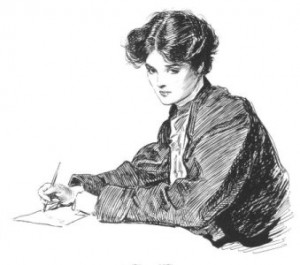Rosa Bell (b. 1902): Life Writing, Class & Identity
“In those days how did we pass our time, you would no doubt say – well it must have been awful – no tellies – no Discos – no going away on Holidays no money in your pockets perhaps sometimes we only had a copper or two, yes it was wonderful to be silver a silver sixpence.” (pg. 89)
Autobiographies and memoirs are often distinguished differently and placed in certain categories depending on what the writer decided to include whilst writing about their personal experiences. Regenia Gagnier, in her essay ‘Working-Class Autobiography, Subjectivity, and Gender’, suggested two different examples of narrative that I have connected Rosa Bell’s memoir to. Firstly, there is the commemorative storytellers’ example. This is where a writer of a memoir decides not to date or specify the time of events whilst recording their story, making it appear jumbled or not planned out properly:
“These commemorative storytellers can be seen as disorganized and reactionary in the negative view […] They present unstructured, thematically arbitrary, disconnected anecdotes and events of a world in which nothing changes.” (pg. 348-349)
The events in Rosa’s memoir are not dated specifically, and she never really gives us an idea what period it is in the twentieth century that she is referring to, particularly when she discusses the lack of employment amongst working class men or even the basic cultural practices that women had to engage in order to care for the home. So there is no real structure to memoir and events often jump back and forth between certain stages: “I remember going with my parents to collect outs from a remote farm with my Parents… I remember that sad day so vividly.” (pg. 93, 94 and 50) It is almost if she wrote out each event out as soon as it sprang to her mind. For example, just the way each section is titled supports this. She could begin with “Collecting Rents With my Father” (pg. 44), to “The Disaster at the mine” (pg. 50) and then followed by “What happened on New Years Eve” (pg. 55). None of these events are connected in a consistent way, the first was when she a child and the third leapt right ahead in time to her adult years, and I could tell this because she mentioned her husband’s name.
Some events in the memoir do make reappearances and in a sense they start to become the narrative’s themes. One of these include household tasks such as cooking meals, making beds, washing clothes etc. and she even dedicates an entire section to spring cleaning: “Yes my word it was cleaning – each room was scrubbed & polished to perfection[/]No vacuum cleaners in those days, all bedding feather Beds, straw mattresses etc were aired and put out in the sunshine.” (pg. 113) These tasks that some people might consider tedious are given details and Rosa very nicely highlights how these practices differ from the easier methods of household cleaning in the present day. So in a way it is quite informative and fits in with the notion of identity as well as the commemorative storyteller method of memoir writing.
The second narrative is that of self-reflection. Gagnier describes this as:
“[…] they are not trying to sell their work so much as to analyze and alleviate their pain […] Unlike other working-class writers, they have accepted the value of introspection and writing as a tool of self-understanding” (pg. 357)
There are stand out moments where the memoir brings out Rosa’s melancholic tone of voice, these include the deaths of the men in the mining community and even Rosa’s personal troubled thoughts: “Were I tell you that in spite of many happy hours I had so many hours when I felt so troubled that I sometimes even then thought of ending it all.” (pg. 143) This is such a vague and yet profound statement that I was concerned with addressing considering that the assumption I could make about it may end up being the wrong one. It does make me wonder all the more about what tricky experiences Rosa may have had to lead her to think like this. Obviously she does consider it to be appropriate to write about and I think the ambiguity of it makes it just as significant as not mentioning it at all.
I agree with Gagnier that these self-reflective narratives ultimately end up diverting into nostalgia, which I believe was Rosa’s aspiration when it came to writing her memoir whilst also passing on her story to her family members.
Further Reading:
- Bell, Rosa. R.h.n. Remembers. Brunel University Library, July 1987.
- Gagnier, Regenia. ‘Working-Class Autobiography, Subjectivity, and Gender.’ Victorian Studies 30.3 (1987): 335-363


Leave a Reply